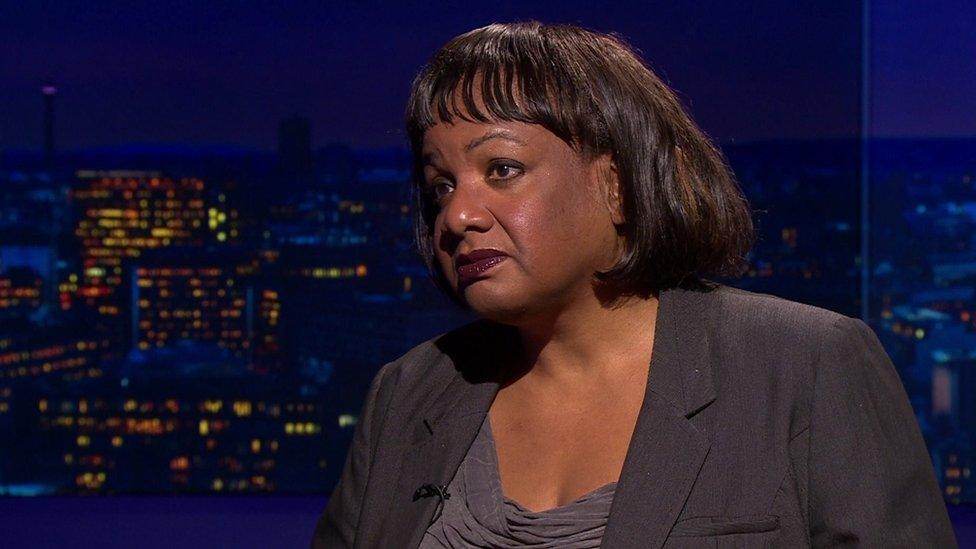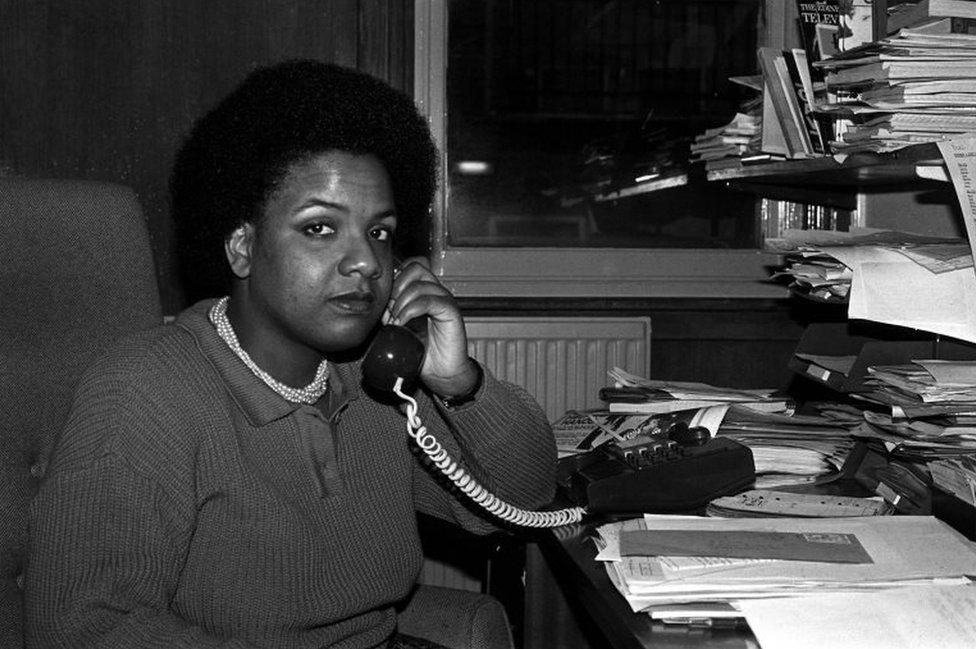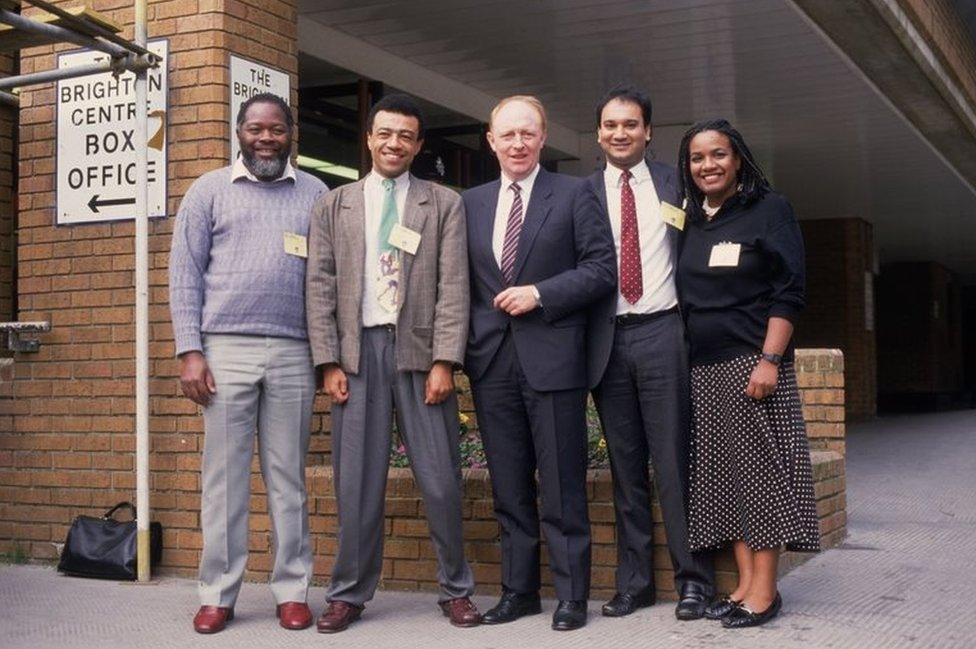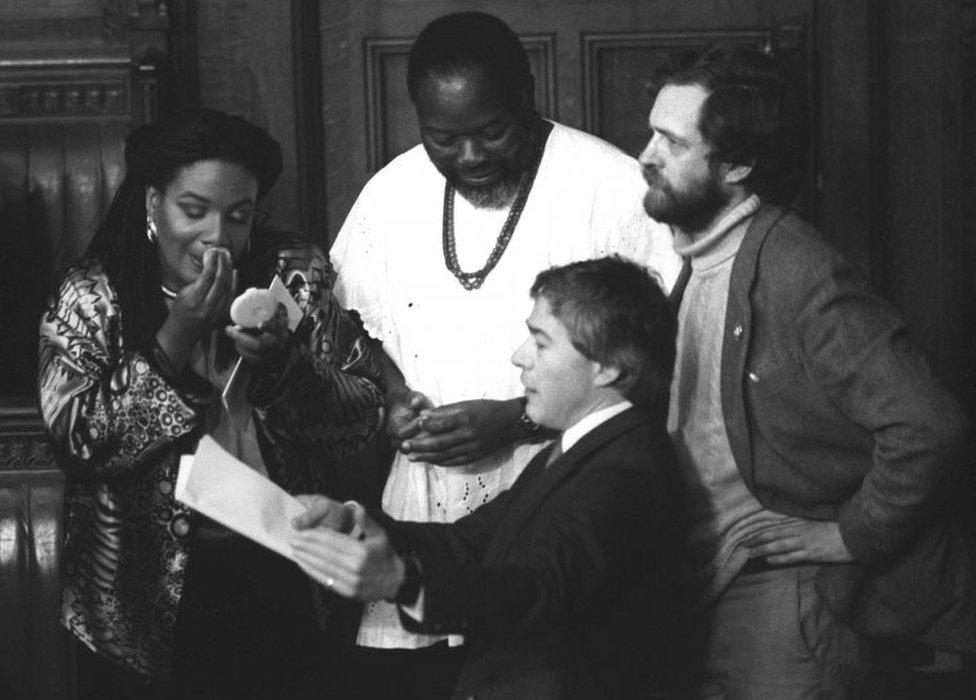Diane Abbott: My struggles and triumphs
- Published

Labour's Diane Abbott, the UK's first black female MP, has been in Parliament for almost 30 years, recently becoming shadow home secretary. She tells BBC Parliament's Conversations programme about the abuse she has faced, her early humiliations and why she believes in Jeremy Corbyn.
On early battles to overcome prejudice
"When I had been at primary school, I was very good at writing essays. It was a big thing. My essays were so good they would get pinned up on the wall and read out to the rest of the class," Ms Abbott told Conversations presenter Sean Curran.
But in her first English class at Harrow County Grammar School, north-west London, she was asked to write a piece.
"The second class the teacher read out the grades and I sat there complacently waiting for my A. And she went, 'A-plus, A, A-minus, B-plus, B, B-minus, C-plus, C, C-minus.' I thought, what's happened? Because at primary school it was always grade As or excellent.
"So, I put up my hand and asked why she hadn't read out my grade. She said, 'Come and see me afterwards.'"
Conversations, featuring Diane Abbott, will be broadcast on BBC Parliament at 20:00 on Sunday, 4 December and will be available afterwards on BBC iPlayer.
"So I went up to her at the end of the class and she was sitting on a sort of dais at her desk, and she got up and she picked up my essay and she held it between her thumb and forefinger and she didn't miss a beat. She said, 'Where did you copy this essay?' So she didn't believe a little chubby black girl with her purple lenses could write an essay like that. I felt humiliated."
For the rest of that year, Ms Abbott said, she "kind of wrote slightly less well than I knew how to because I didn't want to be humiliated again".
But she had a better teacher from her second year and her performances continued to improve.
Ms Abbott, whose parents from rural Jamaica had left school at 14, had ambitions to go to university.
She approached a teacher while in the sixth form at Harrow County, asking about applying to Cambridge, to be told: "I don't think you are up to it."
"This was a pivotal moment for me," said Ms Abbott, "I looked at her and something made me say, 'But I do, and that's what matters, isn't it?'"
She got a place at Newnham College, Cambridge where she studied history.
Search for power

When she applied for a graduate job at the Home Office, Ms Abbott was asked why she wanted to work for the civil service.
"I didn't skip a beat," she told Conversations. "I said, 'I want power." The rest of them reeled back. I suppose that's the story of my life - seeking power."
After working in public relations for the Greater London Council and as a news researcher for Thames TV, and becoming a Westminster councillor, Ms Abbott was elected to Parliament in 1987.
Representing Hackney North and Stoke Newington, in east London, she became the UK's first black female MP. Fellow non-white Labour MPs Keith Vaz, Paul Boateng and Bernie Grant entered Parliament at the same time.

Diane Abbott says she and her fellow non-white MPs, posing here with Labour leader Neil Kinnock, were regarded as potentially troublesome
"It was just us, really," said Ms Abbott. "For a long time you used to get stopped - 'Where are you going?' And I had to say, 'Well, actually, we are Members of Parliament.'
"And even some of our own party were slightly wary. And there was a feeling in Parliament when we arrived that we would be like the 19th-Century Fenians and disrupt and cause problems and keep them up at night."
Social media abuse is getting worse
"I've always kept the faith," said Ms Abbott. "I'm in politics to be a voice for people who don't have a voice."
"I've had a lot of attacks and abuse and sometimes I've really felt despair," she said, "but it's then that my friends have stepped in and said, 'Now, Diane, you have got to continue.' So, I owe a lot to my friends, both in politics and outside politics.
"There's no question women politicians get a level of abuse online which men don't get. New media and the anonymity has unleashed a really quite violent misogyny which I didn't see when I started in politics, although consistently women always get more severe abuse in the media than men.
"I get horrible abuse on social media," Ms Abbott added. "I get a lot of the abuse you hear about given to women in the public eye. I also get horrible racial abuse.
"It's got worse. The whole issue of abuse online has got worse in the last couple of years. I think a lot of it's got to do with anonymity. But I don't think we've exactly gone backwards. I just think that people that didn't feel able to say these things now feel able to say these things while they are anonymous.
"But that's no comfort to people who are abused. We have to redouble our efforts and companies like Twitter and Google and the online companies have to do more to check those anonymous online. That's very important."
Son's school
In 2003, Ms Abbott was criticised for sending her son James to the private City of London school. She was accused of hypocrisy, having criticised Prime Minister Tony Blair and Solicitor General Harriet Harman for sending children to selective schools.
She told Sean Curran: "One of the reasons it comes up is that female politicians are criticised for decisions that they make about their children but men - never.
"Harriet Harman was criticised severely for sending her children to selective schools, but she wasn't the only MP who had children at selective schools...
"The criticism is addressed to women MPs, but it's never addressed to male MPs."
Ms Abbott said former Justice Secretary Lord Falconer had not faced the same for sending his children to private school but the current shadow attorney general, Baroness Chakrabarti "had a son at a selective school and there's been weeks and weeks of criticism".
Ms Abbott added: "Of course if I had a son at secondary school today, after the Labour government investment that we got into Hackney schools, I would not have hesitated in sending him to a secondary school in Hackney.
"We had just come out of a Tory government. Hackney secondary schools, in particular the results for boys, were some of the lowest in the country. There were particular circumstances which don't apply now."
Jeremy Corbyn

Diane Abbott and Jeremy Corbyn (right) are longtime allies
Ms Abbott described Jeremy Corbyn, a longtime friend who brought her into the shadow cabinet, as "selfless", adding that it was wrong to think of his success in two Labour leadership contests as being "a cult of personality".
"He wouldn't have had those young people so enthused if all he was offering was politics that were 30 years old," Ms Abbott, who represents Hackney South and Stoke Newington, said. "He's got a set of principles that are still relevant to current conditions."